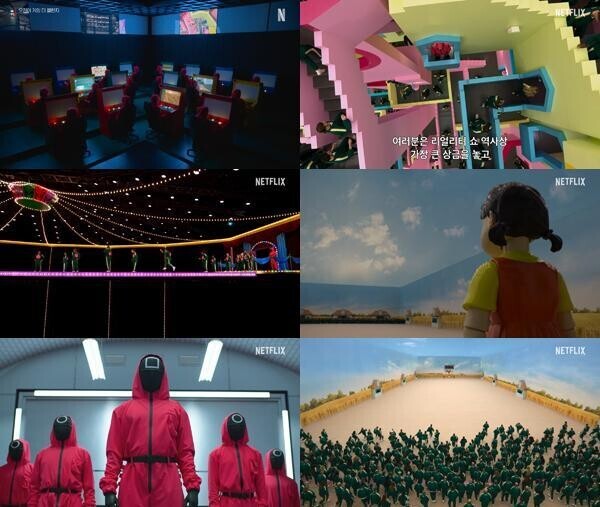hankyoreh
Links to other country sites 다른 나라 사이트 링크
In “Squid Game: The Challenge,” Korean creatives come in last

“Squid Game: The Challenge,” a US-produced reality competition show based on the 2021 Netflix series “Squid Game,” premiered on Wednesday.
The 10-episode series borrows the setting of the original hit Korean show, where 456 contestants participate in a survival game and the last one standing wins 45.6 million won. “Squid Game: The Challenge” has 456 players competing for a prize of US$4.56 million.
After watching an online preview of the show, I can say that it appears to utilize the narrative of the original series well.
It features the same games that audiences around the world are now familiar with, such as “red light, green light” and the “dalgona” honeycomb toffee candy challenge. When a contestant is eliminated, they are shown collapsing as if they have been shot, with black ink spurting out of their chests.
While I’m looking forward to this new take on “Squid Game,” which has raised the status of so-called “K-dramas,” I cannot help feeling a little helpless. Unlike the TV series, Koreans were not involved in the creation of the reality competition show.

“Squid Game: The Challenge” was produced by Studio Lambert, the same company behind the popular American game show “The Traitors.”
The storyline is taken from the original series, and Korean signs are used throughout the program, but the cast is mostly from English-speaking countries, mainly the US.
Concerns about the intellectual property belonging to Netflix that arose after the success of “Squid Game” in 2021 have ultimately been borne out. Despite creating the show, Koreans cannot capitalize on it. We should use the arrival of “Squid Game: The Challenge” as an opportunity to pause our celebration of everything “K-” going global and take a hard look at the reality of what’s happening to Korean creative works.
While “Squid Game” certainly raised the profile of Korean creative content to new heights, it hasn’t come without its share of fallout. South Korean creators’ overconfidence in their global successes and achievements, coupled with the increasing number of platforms, has created a bubble in which a single proposal is all it takes to make it big.
With the advent of global streaming platforms, actors’ salaries skyrocketed and the cost of producing series rose steeply, as did the number of highly paid staff. Stories of losing money on each production are popping up all over the place, raising skepticism about the future of K-dramas.
South Korean streaming platforms pushed themselves to their limits to invest in the rosy future of K-content, but now, that hard work is now coming back to bite them. As platforms’ deficits grow, the bold investments of the early years are harder to find. Case in point, only a handful of original TV series have been produced this year.
It’s time to think deeply about what choices we should make in the midst of this K-content crisis. This may seem cliché, but we need to get back to the basics. We shouldn’t get carried away with K-content castles in the sky, but instead look for real benefits.
IP issues should be sorted out from the beginning of any contract, and investments should be made in works with high-quality scripts instead of being blockbusters, which have grown in scale without offering any substantial content.
Taiwan’s “Someday or One Day” is a good example to follow. It is a small-scale melodramatic fantasy movie, but it gained a worldwide fan base by elevating its competitiveness with a tight script.
In the era of streaming platforms, we also gained competitiveness by wading out into global waters. We shouldn’t think about our content the same way as when “Squid Game” was released in 2021.
The global content market has also entered the titular “squid game” of sorts. Global streaming platforms have released large amounts of capital as a foundation, and local production companies are fighting for survival.
Companies cooperate, of course, but also there are instances of backstabbing and betrayal. And even when they succeed, there are times when they lose more than they gain. If we don’t play this global game by staying calm at some times, being bold at others, while also treading with caution, we may have trouble finding actual profit.

If we’re not careful, we’ll be stuck deep in a battle royale that not only robs us of all our money, but our wits, as well.
By Jung Duk-hyun, cultural critic
Please direct questions or comments to [english@hani.co.kr]

Editorial・opinion
![[Column] When ‘fairness’ means hate and violence [Column] When ‘fairness’ means hate and violence](https://flexible.img.hani.co.kr/flexible/normal/500/300/imgdb/original/2024/0516/7417158465908824.jpg) [Column] When ‘fairness’ means hate and violence
[Column] When ‘fairness’ means hate and violence![[Editorial] Yoon must stop abusing authority to shield himself from investigation [Editorial] Yoon must stop abusing authority to shield himself from investigation](https://flexible.img.hani.co.kr/flexible/normal/500/300/imgdb/original/2024/0516/4417158464854198.jpg) [Editorial] Yoon must stop abusing authority to shield himself from investigation
[Editorial] Yoon must stop abusing authority to shield himself from investigation- [Column] US troop withdrawal from Korea could be the Acheson Line all over
- [Column] How to win back readers who’ve turned to YouTube for news
- [Column] Welcome to the president’s pity party
- [Editorial] Korea must respond firmly to Japan’s attempt to usurp Line
- [Editorial] Transfers of prosecutors investigating Korea’s first lady send chilling message
- [Column] Will Seoul’s ties with Moscow really recover on their own?
- [Column] Samsung’s ‘lost decade’ and Lee Jae-yong’s mismatched chopsticks
- [Correspondent’s column] The real reason the US is worried about Chinese ‘overcapacity’
Most viewed articles
- 1China calls US tariffs ‘madness,’ warns of full-on trade conflict
- 2[Column] US troop withdrawal from Korea could be the Acheson Line all over
- 3[Editorial] Yoon must stop abusing authority to shield himself from investigation
- 4[Column] When ‘fairness’ means hate and violence
- 5[Column] How to win back readers who’ve turned to YouTube for news
- 6US has always pulled troops from Korea unilaterally — is Yoon prepared for it to happen again?
- 7[Book review] Who said Asians can’t make some good trouble?
- 8Naver’s union calls for action from government over possible Japanese buyout of Line
- 9Could Korea’s Naver lose control of Line to Japan?
- 10[Editorial] Korea must respond firmly to Japan’s attempt to usurp Line